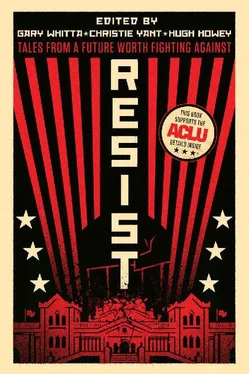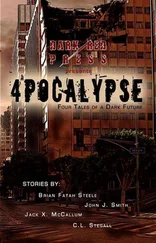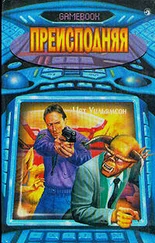RESIST
TALES FROM A FUTURE WORTH FIGHTING AGAINST
Edited by Gary Whitta, Christie Yant, Hugh Howey
THANK YOU FOR buying this book. By doing so you’re helping to support an important cause. A minimum of 50% of the purchase price will be donated to the American Civil Liberties Union.
For nearly 100 years, the ACLU has been our nation’s guardian of liberty, working in courts, legislatures, and communities to defend and preserve the individual rights and liberties that the Constitution and the laws of the United States guarantee everyone in this country.
Whether it’s achieving full equality for LGBT people, establishing new privacy protections for our digital age of widespread government surveillance, ending mass incarceration, or preserving the right to vote or the right to have an abortion, the ACLU takes up the toughest civil liberties cases and issues to defend all people from government abuse and overreach.
With more than 2 million members, activists, and supporters, the ACLU is a nationwide organization that fights tirelessly in all 50 states, Puerto Rico, and Washington, D.C., to safeguard everyone’s rights.
THE FUTURE IS unknown, which is both exciting and terrifying. It is a place for dreamers and worriers to project their hopes and fears. Science fiction as a literary genre has a long history of filling readers’ minds with wondrous possibilities but also dire predictions. Utopias and dystopias. Flying cars and murderous robots.
And while every generation makes the mistake of thinking their time is special, there is some truth in this egoistic view—for all times are special in equal amounts. The recent past is always worth exploring, the present is always full of miraculous advancements, and the future always holds both promise and danger. This is most evident when it feels as if the past is repeating itself.
This anthology has been collected in just such times. There are echoes today of the same nationalism, protectionism, and xenophobia that led to last century’s world wars. Icons of heinous civil wars are being torn down, and those same acts are being protested by those who think our ugliest times were our best times. There are world leaders today whose rhetoric reminds us of speeches we thought we would never tolerate again.
It’s common enough to wonder how we might have responded had we lived in different times. Would we stand up for the rights of others and risk our privilege? Would we be brave enough to speak truth to power if we were in an unprotected minority? It’s easy to be brave after the fact; how would we respond in the moment?
This feels like one of those moments. But the truth is that if you look hard enough, these moments never go away. There is always something good worth fighting for and something bad worth resisting. The unknown future is created by the choices we make today. The warnings and promise of George Orwell’s 1984 and Arthur C. Clark’s 2001: A Space Odyssey get everything right except the dates. Margaret Atwood was clever to avoid that mistake, and there’s a reason her Handmaid’s Tale is back with a vengeance. These stories should never date themselves. We should always be wary of and joyful for the future in equal measure.
The undeniable and unbelievable truth is that the future is always better than the past. We do make progress. But the world only gets better because we fight for it. We fight by voting, marching, volunteering, donating, parenting, mentoring, and yes sometimes even Tweeting. And for some of us, the thing we do best is to write entertaining warnings, to draw readers in with stories and characters that capture the imagination while liberating the spirit. That’s what we, the editors, hope to accomplish with this anthology. It comes from a wide variety of voices, but they sing in chorus. They sing about a future that might be dire, but that we believe we are collectively amazing enough to avoid. It is a future that entertains, but is worth fighting against. We hope you enjoy. And we hope to see you all soon in a very different future.
Gary Whitta, Christie Yant, and Hugh Howey
AMERICA: THE RIDE
CHARLES YU
WE HAVE A kid now and another on the way and—the idea is, the hope is—that we are, at least in a technical sense, adults.
We’d always assumed we would know more, would have accomplished more, by the time we got to this point, assumed we would have turned into different people, better people. That was the idea. That was the hope.
Looking back over our shoulders, we can see the track stretching out behind us, an unbroken line from where we got on to where we are now.
The voice of the American ride says:
Please keep your attention focused in a sideways direction.
Reminding us the proper way to enjoy this, which is not to look back, because looking back is the easiest way to get hurt. Or, worse, to convince yourself that you want to get off. And also, it’s also not proper procedure to look forward, no matter how tempting it is to do so. We sit facing west while our tram car moves north, and we do our best not to look in the northern direction, although we are encouraged by what we feel to be a subtle, gentle, but unmistakable angle of incline of the track below us. We are moving up a slope, building toward something, to a higher place. Some of us worry about what this means. Some of us worry about whether an upslope now implies a downslope later, but some others of us say that it doesn’t have to be so, that we are not bodies in flight, our arc through the sky pre-carved by gravity. We are on an engineered system, an amusement, a transportation. This was designed by our best minds, assembled by our best hands, and constantly improved by our innovation and creativity. There is no reason to assume that there must be a high point to all this, that we will eventually have to convert all of this elevation and potential energy into speed and kinetic energy, that what we are storing thermodynamically must eventually be given back, paid back like an entropic or economic debt.
The voice reminds us again to keep our hands and feet inside at all times and to maybe take our eyes off our phones for like, one second, and gaze outward as we make our way along the tracks. Not to turn around in our seats and look backward in the direction of history, at the past which is already gone, but to always look forward, at the grandeur of the vistas, the sweep of world events unfolding, which we are a part of, which is what we paid for, four hundred dollars a ticket, half-price for children (although as they grow, they will eventually turn into full-fare passengers on this ride, and we worry about the mechanics of how that incremental fare will be collected, whether we will be able to pay for them or if they will need to pay for it themselves, who will come for it, and whether we will still be around, whether we will have any warning, whether we will still be able to stay in this car with them or whether they will need to get out and ride in their own vehicles, we worry whether the track might diverge at some point and they will be off into a different set of tunnels and rooms and we will never see them again).
The sweep of history, having this unspoken feeling of forward and upward momentum, while being entertained, all of that goes into the ticket price, and the voice of the woman who narrates the ride, she reminds us that it is our purchase of these tickets that makes the ride possible. We are the customers, but we are also the underwriters of this entertainment. We are consumers of this experience. We are tourists in our own creation.
Читать дальше












